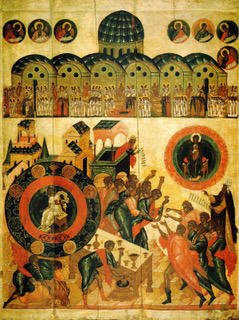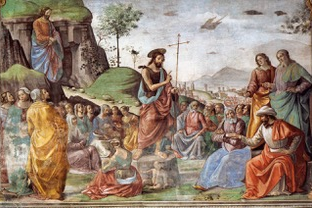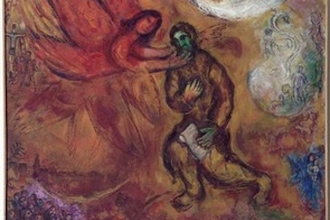Sunday Reflection with Canon Robin Gibbons: 18th August 2024

Holy Wisdom Created Icon
20th Sunday in Ordinary Time
'Whoever eats my flesh and drinks my blood remains in me and I in him. Just as the living Father sent me and I have life because of the Father, so also the one who feeds on me will have life because of me. This is the bread that came down from heaven. Unlike your ancestors who ate and still died, whoever eats this bread will live forever." (Jn 6: 56-58)
Unlike older more previous religious generations, we are not good at distinguishing signs from symbols, we can see it in the way people respond to issues, such as the opening in the Paris Olympics which became bizarrely associated with blasphemy, or that outraged attack on the Amazonian Pachamama image which completely missed the point of what Christianity has always done, adopting the good symbols of other cultures.
There seems to be a supreme loss of self reflective humour in our faith tradition here, and when it comes to our understanding of the Holy Eucharist it can become very contentious indeed.
I write not only as a pastor but as one who has taught and researched in theology for well over 45 years. Once we start ignoring the wisdom of the symbol structure of our faith and instead take the road of literalism and sign we deprive ourselves and others of a quality given to us in that quote from John 6.
The key is that word life, eating and drinking the food of Christ's body and blood is not just about an action such as receiving communion at Mass, but a way of life, one in which like children we require continual nourishment that we might grow into the life of the Most High. The Christian, Catholic symbol of the Eucharist itself is immense and cannot be contained by our human thought, it is never a static distant object but a dynamic gift give by Christ in which we meet him, but are then called out to be the gift of 'Thanksgiving' (Eucharist) in our world.
So taking those words of Jesus as a reminder we do not have all the answers, but like everybody else , need a constant nourishment of love rooted in the open relationship with Christ, empowered by the mystery and dynamism of the life-giving Spirit. This is where a reflection of Wisdom helps us a little. As I noted we are not good at entering into the world of religious symbols, tending to seek solace in the meaning of the unequivocal, direct sign. Fine if you are driving a car, following a Satnav, or reading a recipe, doing anything that requires clear focus and correct procedure, but this is not the place of the interaction between the Divine and Human worlds. This is where the figure of Wisdom is important.
In our ancient Christian tradition, the figure of Wisdom is that mysterious and real symbol of an attribute and presence of the Holy One. The Hebrew scriptures personify wisdom as a gift at work within our human world, touching it by connecting with us. The poetic and imaginative figure of Wisdom is inviting, dynamic, very much alive:
" She has sent out her maidservants; she calls
from the heights out over the city:
"Let whoever is naive turn in here;
to any who lack sense I say,
Come, eat of my food,
and drink of the wine I have mixed!
Forsake foolishness that you may live;
advance in the way of understanding."(Prov 6: 3-6)
We know that this is not literal in the sense of the words before us, but we know it is real in the imaginative and internal way we accept and receive the mystery, for it hints at the hidden and guessed things of our deepest desires and intimate thoughts. We honour Holy Wisdom in many ways, there is the Eastern tradition of the feminine attribution of God as Wise, as a dynamism of wisdom at work to enlighten and enlarge us as people, it is no accident that one of the greatest and most magnificent examples of luminous and transcendent church architecture is Hagia Sophia in present day Istanbul. There in 987AD, envoys of the Slavs trying to find a suitable religion for Vladimir I discovered in liturgy, word, icons, incense, frecoes and space a touch of heaven on earth. "And we went into the Greek lands, and we were led into a place where they serve their God, and we did not know where we were, on heaven or on earth; and do not know how to tell about this. All we know is that God lives there with people and their service is better than in any other country."
That is how symbol works, mediating a greater presence hidden in and by them. But there is also another more intimate side of this manifestation of God, in the sedes sapientiae, that beautiful ancient art of Mary seated, her knees as a throne for the Saviour, Christ Emmanuel sitting there, thus drawing attention to her human expression on behalf of us all, that of the Incarnation being held and nourished in human life and love.
This is perhaps where we can pause and let the images of Eucharist and those meals of Jesus with others, and of his illustrations of the Kingdom as a feast of unending joy enter into our imaginations. It is to rejoice in the mysteries of our God at work and play with us in life, of a Christ who does not define but opens out endlessly a way towards that great feast. In our turn we need to work at being wise, how depends of the way our personalities and lives unfold, where we are, what we are doing, but always with the help of that Holy Wisdom. There is no excuse for remaining static in our faith, standing firm in faith is not the same, this is growing, like Mary, like the Apostles in knowledge each and every day rooting ourselves in the mystery of a loving God, needing us , wanting us and caring for us all. 'Therefore, do not continue in ignorance, but try to understand what is the will of the Lord." Amen. (Eph 5: 17)
Lectio Divina
Justin Martyr
The Word of Wisdom, who is Himself this God begotten of the Father of all things, and Word, and Wisdom, and Power, and the Glory of the Begetter, will bear evidence to me, when He speaks by Solomon the following: 'If I shall declare to you what happens daily, I shall call to mind events from everlasting, and review them. The Lord made me the beginning of His ways for His works. From everlasting He established me in the beginning, before He had made the earth, and before He had made the deeps, before the springs of the waters had issued forth, before the mountains had been established. Before all the hills He begets me. God made the country, and the desert, and the highest inhabited places under the sky. When He made ready the heavens, I was along with Him, and when He set up His throne on the winds: when He made the high clouds strong, and the springs of the deep safe, when He made the foundations of the earth, I was with Him arranging. I was that in which He rejoiced; daily and at all times I delighted in His countenance, because He delighted in the finishing of the habitable world, and delighted in the sons of men. Now, therefore, O son, hear me. Blessed is the man who shall listen to me, and the mortal who shall keep my ways, watching daily at my doors, observing the posts of my ingoings. For my outgoings are the outgoings of life, and [my] will has been prepared by the Lord. But they who sin against me, trespass against their own souls; and they who hate me love death.
Thomas Merton's Prayer everyone can pray
"My Lord God, I have no idea where I am going. I do not see the road ahead of me. I cannot know for certain where it will end. Nor do I really know myself, and the fact that I think that I am following your will does not mean that I am actually doing so. But I believe that the desire to please you does in fact please you. And I hope I have that desire in all that I am doing. I hope that I will never do anything apart from that desire. And I know that if I do this you will lead me by the right road, though I may know nothing about it. Therefore will I trust you always, though I may seem to be lost and in the shadow of death. I will not fear, for you are ever with me, and you will never leave me to face my perils alone."


















